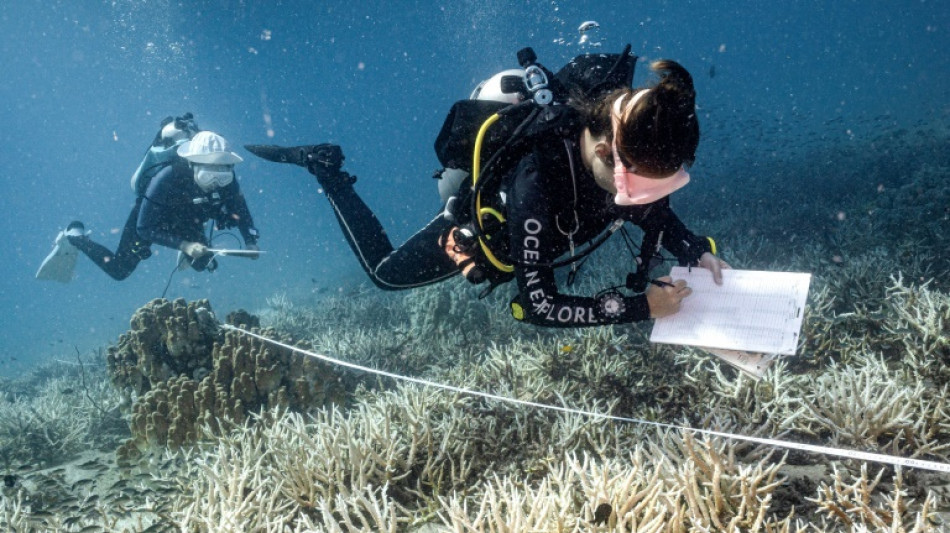
-
 Bangladesh's BNP heading for 'sweeping' election win
Bangladesh's BNP heading for 'sweeping' election win
-
Hisatsune grabs Pebble Beach lead with sparkling 62

-
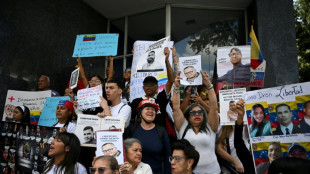 Venezuela amnesty bill postponed amid row over application
Venezuela amnesty bill postponed amid row over application
-
Barca taught 'lesson' in Atletico drubbing: Flick

-
 Australia's Liberals elect net zero opponent as new leader
Australia's Liberals elect net zero opponent as new leader
-
Arsenal must block out noise in 'rollercoaster' title race: Rice

-
 Suns forward Brooks banned one game for technical fouls
Suns forward Brooks banned one game for technical fouls
-
N. Korea warns of 'terrible response' if more drone incursions from South

-
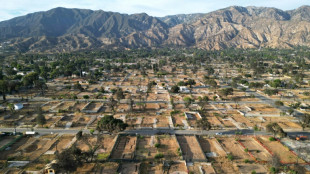 LA fires: California probes late warnings in Black neighborhoods
LA fires: California probes late warnings in Black neighborhoods
-
Atletico rout Barca in Copa del Rey semi-final first leg

-
 Arsenal held by Brentford to offer Man City Premier League title hope
Arsenal held by Brentford to offer Man City Premier League title hope
-
US snowboard star Kim 'proud' as teenager Choi dethrones her at Olympics

-
 Chloe Kim misses Olympic milestone, Ukrainian disqualfied over helmet
Chloe Kim misses Olympic milestone, Ukrainian disqualfied over helmet
-
Tech shares pull back ahead of US inflation data

-
 'Beer Man' Castellanos released by MLB Phillies
'Beer Man' Castellanos released by MLB Phillies
-
Canada PM to join mourners in remote town after mass shooting

-
 Teenager Choi wrecks Kim's Olympic snowboard hat-trick bid
Teenager Choi wrecks Kim's Olympic snowboard hat-trick bid
-
Inter await Juve as top guns go toe-to-toe in Serie A

-
 Swiatek, Rybakina dumped out of Qatar Open
Swiatek, Rybakina dumped out of Qatar Open
-
Europe's most powerful rocket carries 32 satellites for Amazon Leo network into space

-
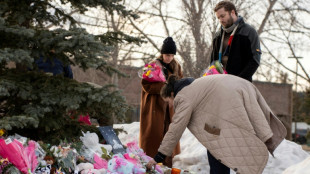 Neighbor of Canada mass shooter grieves after 'heartbreaking' attack
Neighbor of Canada mass shooter grieves after 'heartbreaking' attack
-
French Olympic ice dance champions laud 'greatest gift'

-
 Strange 'inside-out' planetary system baffles astronomers
Strange 'inside-out' planetary system baffles astronomers
-
Teenager Choi denies Kim Olympic snowboard hat-trick

-
 Swiss bar owners face wrath of bereaved families
Swiss bar owners face wrath of bereaved families
-
EU vows reforms to confront China, US -- but split on joint debt
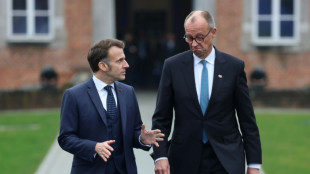
-
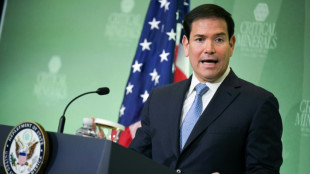 Rubio heads to Munich to heap pressure on Europeans
Rubio heads to Munich to heap pressure on Europeans
-
Less glamour, more content, says Wim Wenders of Berlin Film Fest

-
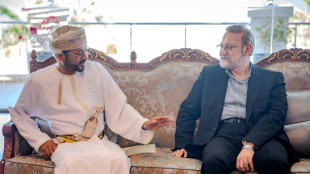 What is going on with Iran-US talks?
What is going on with Iran-US talks?
-
Wales 'means everything' for prop Francis despite champagne, oysters in France

-
 Giannis out and Spurs' Fox added to NBA All-Star Game
Giannis out and Spurs' Fox added to NBA All-Star Game
-
The secret to an elephant's grace? Whiskers

-
 Chance glimpse of star collapse offers new insight into black hole formation
Chance glimpse of star collapse offers new insight into black hole formation
-
UN climate chief says 'new world disorder' threatens cooperation
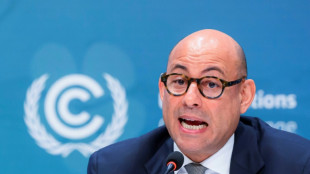
-
 Player feels 'sadness' after denied Augusta round with grandsons: report
Player feels 'sadness' after denied Augusta round with grandsons: report
-
Trump dismantles legal basis for US climate rules

-
 Former Arsenal player Partey faces two more rape charges
Former Arsenal player Partey faces two more rape charges
-
Scotland coach Townsend adamant focus on England rather than his job

-
 Canada PM to visit town in mourning after mass shooting
Canada PM to visit town in mourning after mass shooting
-
US lawmaker moves to shield oil companies from climate cases
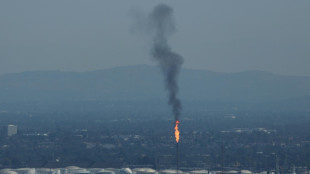
-
 Ukraine says Russia behind fake posts targeting Winter Olympics team
Ukraine says Russia behind fake posts targeting Winter Olympics team
-
Thousands of Venezuelans stage march for end to repression
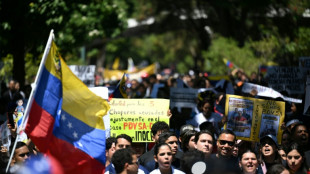
-
 Verstappen slams new cars as 'Formula E on steroids'
Verstappen slams new cars as 'Formula E on steroids'
-
Iranian state TV's broadcast of women without hijab angers critics
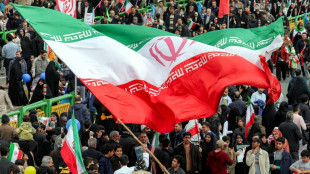
-
 Top pick Flagg, France's Sarr to miss NBA Rising Stars
Top pick Flagg, France's Sarr to miss NBA Rising Stars
-
Sakkari fights back to outlast top-seed Swiatek in Qatar

-
 India tune-up for Pakistan showdown with 93-run rout of Namibia
India tune-up for Pakistan showdown with 93-run rout of Namibia
-
Lollobrigida skates to second Olympic gold of Milan-Cortina Games

-
 Comeback queen Brignone stars, Ukrainian banned over helmet
Comeback queen Brignone stars, Ukrainian banned over helmet
-
Stocks diverge as all eyes on corporate earnings


Countries lock horns over cash for nature at rebooted UN talks
The world's biggest nature conservation conference will restart on Tuesday after negotiations collapsed in disarray last year, with the head of the meeting warning that increasing global "polarisation" was frustrating efforts to protect the planet.
More than two years after a landmark deal on nature -- including a pledge to protect 30 percent of the world's land and seas by 2030 -- nations continue to haggle over the money needed to reverse destruction that scientists say threatens a million species.
Negotiators meeting at the UN's Food and Agriculture Organization headquarters in Rome this week are tasked with breaking a deadlock on funding between rich and developing countries that saw COP16 talks in Cali, Colombia end without agreement in November.
The leader of the UN negotiations, Colombian Environment Minister Susana Muhamad, said countries need to "substantially address these existential crises of biodiversity loss and climate change".
But she said progress in Cali was hamstrung by international rifts.
"Why do we have such polarisation around that issue?" she told a press conference on Monday.
"It has to do, I think in my perspective, with the changing landscape of power in geopolitics, and it has also to do with the requirements that armed conflicts are putting on finance of countries."
Muhamad did not mention specifics, but policymakers in wealthy nations are facing challenges from trade tensions to the war in Ukraine.
The re-election of Donald Trump is also casting a shadow, despite the United States not having signed up to the UN's Convention on Biological Diversity.
- Funding fight -
Muhamad said she was "hopeful" that discussions since the Cali meeting have helped to lay the groundwork for a resolution in Rome.
Countries have until Thursday to hammer out a plan to reach a promised $200 billion a year in finance for nature by 2030, including $30 billion a year from wealthier countries to poorer ones.
The squabble in Cali was mainly over the way in which that funding is delivered.
Developing nations -- led by Brazil and the African group -- want the creation of a new, dedicated biodiversity fund, saying they are not adequately represented in existing mechanisms.
Wealthy nations -- led by the European Union, Japan and Canada -- say setting up multiple funds fragments aid.
On Friday, the COP16 presidency published a new text that seeks to navigate around the "red lines" of each bloc of countries, according to Aleksandar Rankovic of the Common Initiative think tank.
The document proposed kicking the ultimate decision on a new biodiversity fund to future UN talks, while suggesting reforming existing financing for nature conservation.
Observers will be watching closely to see if developed countries, including those in budgetary crises like France and Germany, can be persuaded to agree.
In 2022, nations identified 23 goals to be achieved within the decade, designed to protect the planet and its living creatures from deforestation, over-exploitation of resources, climate change, pollution and invasive species.
The true cost of such destruction of nature is often hidden or ignored, scientists warned last year in a landmark report for the UN's expert biodiversity panel.
They estimated that fossil fuels, farming and fisheries could inflict up to $25 trillion a year in accounted costs -- equivalent to a quarter of global GDP.
The failure to reach agreement in Cali was the first in a string of disappointing outcomes for the planet at UN summits last year.
A climate finance deal at COP29 in Azerbaijan in November was slammed as disappointing by developing nations, while in December negotiators failed to produce an agreement on how to respond to drought at Saudi-hosted UN desertification talks.
Divisions between countries also stalled negotiations in South Korea's Busan on the world's first treaty to tackle plastic pollution in December.
L.Miller--AMWN


